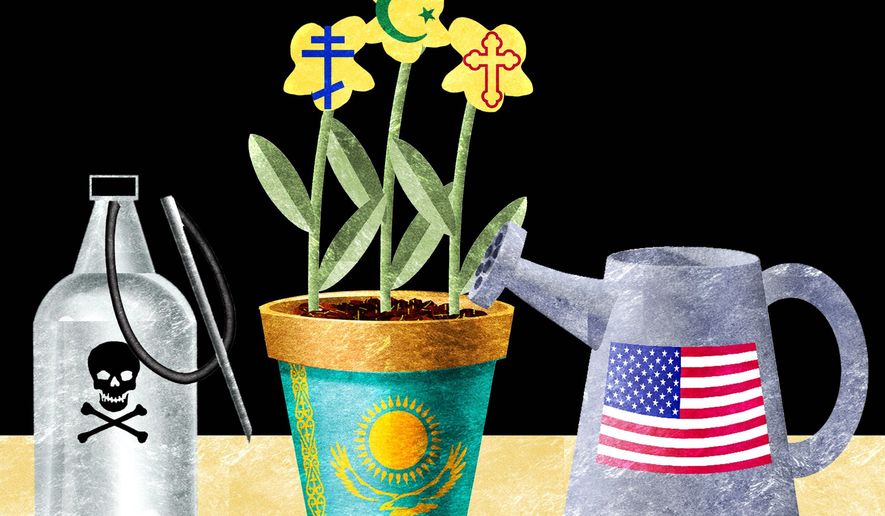OPINION:
ASTANA, Kazakhstan | Kazakhstan is one of the 10 largest countries in the world, yet most Americans couldn’t find it on a map. It spans Central Asia, home to the world’s most sophisticated civilizations in the Middle Ages, yet most Americans know nothing of the region’s ancient cities, scholars and poets. Today, Kazakhstan is a secular and anti-Islamist Muslim-majority nation, yet most Americans have no idea we have friends here.
A smidgen of history: The Kazakhs, one of the great nomadic peoples of the vast Eurasian steppes, fell under the boots of the Russian Empire beginning in the 18th century. After the Russian Revolution, they were conquered by the Red Army. Stalin’s policies, including a man-made famine in the early 1930s, an echo of the Holodomor in Ukraine, killed an estimated 2 million Kazakhs.
Stalin incorporated Kazakhstan into his Gulag. The best-known political prisoners exiled to “southern Siberia” were Leon Trotsky and Aleksandr Solzhenitsyn. Also sent to its labor camps were thousands of Crimean Tatars, Muslims from the Caucasus, Jews, ethnic Germans, ethnic Poles and ethnic Koreans. Kazakhs soon became a minority in their own land.
With the collapse of the U.S.S.R. in 1991, Kazakhstan achieved independence. Since then, the Kazakh population has grown while millions of Russians have left. Just over 60 percent of the country’s 18 million citizens are now Kazakhs. Ethnic Russians constitute about 20 percent.
In the post-Soviet era, significant petroleum reserves have been discovered. Kazakhstan is now the world’s 15th largest oil producer. Two years ago, Chevron announced a $36.8 billion investment deal that could catapult the country into the top 10. But for Kazakhstan to become a major global economy will require diversification — oil alone is not enough — and a war against corruption.
Nevertheless, results of the new oil wealth are apparent. Astana became the country’s capital in 1997 and has been extensively developed since. Its architecture, reminiscent of Dubai and Las Vegas, expresses the eclectic and eccentric aesthetic of Nursultan Nazarbayev, once the Kremlin’s viceroy, now Kazakhstan’s 78-year-old president.
Along the capital’s grand boulevards are buildings in unexpected shapes: An egg, an eye, a flower, a pagoda, a jug, a lollipop, a tent. The presidential palace resembles the White House — but with a blue dome on top.
President Obama largely ignored Kazakhstan and Central Asia. By contrast, President Trump made a little pivot to the region, recently welcoming Mr. Nazarbayev to the (Washington) White House.
Three reasons: (1) Kazakhstan gave up the nukes it inherited from the Soviet Union, an example worth emphasizing as Mr. Trump attempts to terminate the North Korean and Iranian nuclear weapons programs. (2) Late last year Kazakhstan became chairman of the U.N. Security Council, the first time a Central Asian state has held that position. (3) Kazakhstan provides what Mr. Trump called “crucial support” to U.S. forces in Afghanistan at a time when American-Pakistani relations are deteriorating.
Mr. Nazarbayev is keenly aware of the utility a close relationship with the United States can provide. Russia, on Kazakhstan’s northern border, has seized territory from neighboring Ukraine and Georgia. China, on the eastern border, is intent on economic imperialism in Asia and beyond. Not far away are Turkey and the Islamic Republic of Iran, both harboring hegemonic ambitions.
In Washington, Mr. Nazarbayev also met with Vice President Pence who strongly urged him to meet his “commitments” to protect religious freedom as guaranteed by Kazakhstan’s constitution.
Which brings us to why I’m in this country. I moonlight as a pro bono member of the U.S. Commission on International Religious Freedom, an independent, bipartisan government agency that shares Mr. Pence’s concerns. (Other opinions expressed in this column should be regarded as mine alone.)
Rev. Thomas Reese, also a USCIRF commissioner, policy analyst Dr. Andrew Kornbluth, and I are here to fact-find and advocate for more freedom of religion and belief — not less. A package of draft laws that most of the country’s religious leaders oppose particularly troubles us.
Officials at both the parliament and the (Astana) White House are open to discussion. They say the legislation is intended to bolster national security. Terrorists have launched attacks here as recently as two years ago. A long list of Islamist groups would like to gain a foothold. Not all support terrorism or call for jihad but more than a few espouse theologies/ideologies that ineluctably lead in that direction.
At the same time, the officials acknowledge that Islam as traditionally practiced in Kazakhstan poses no threat. Neither do members of the Russian Orthodox Church, the second largest religious group. Nor, certainly, do Roman Catholics, Lutherans or such “non-traditional” religious minorities as evangelical Christians, Jehovah’s Witnesses, Mormons and Ahmadis.
In fairness, I should add that Kazakhstan, an officially secular state, is more tolerant than most of its neighbors. Russia, China, Iran, Pakistan, Uzbekistan, Tajikistan, and Turkmenistan have all been designated by USCIRF as Countries of Particular Concern, a diplomatic way of saying they are egregious violators of religious freedom.
Eventually, a senior official tells us that the legislation is a work in progress, still subject to revision and, at this point, not as restrictive as we’ve been led to believe. We ask if it would be possible to see the latest version. They agree but, as this column goes to press, no documents have arrived.
That’s not necessarily a bad sign. It’s possible that President Nazarbayev, who views himself as a benevolent authoritarian moving his nation — however languidly — toward democracy, will decide to let the legislation quietly die on the vine. His government could then focus more on economic development and curbing corruption. The outcome might well be a more prosperous and freer Kazakhstan in closer alliance with the U.S.
• Clifford D. May is president of the Foundation for Defense of Democracies and a columnist for The Washington Times.




Please read our comment policy before commenting.